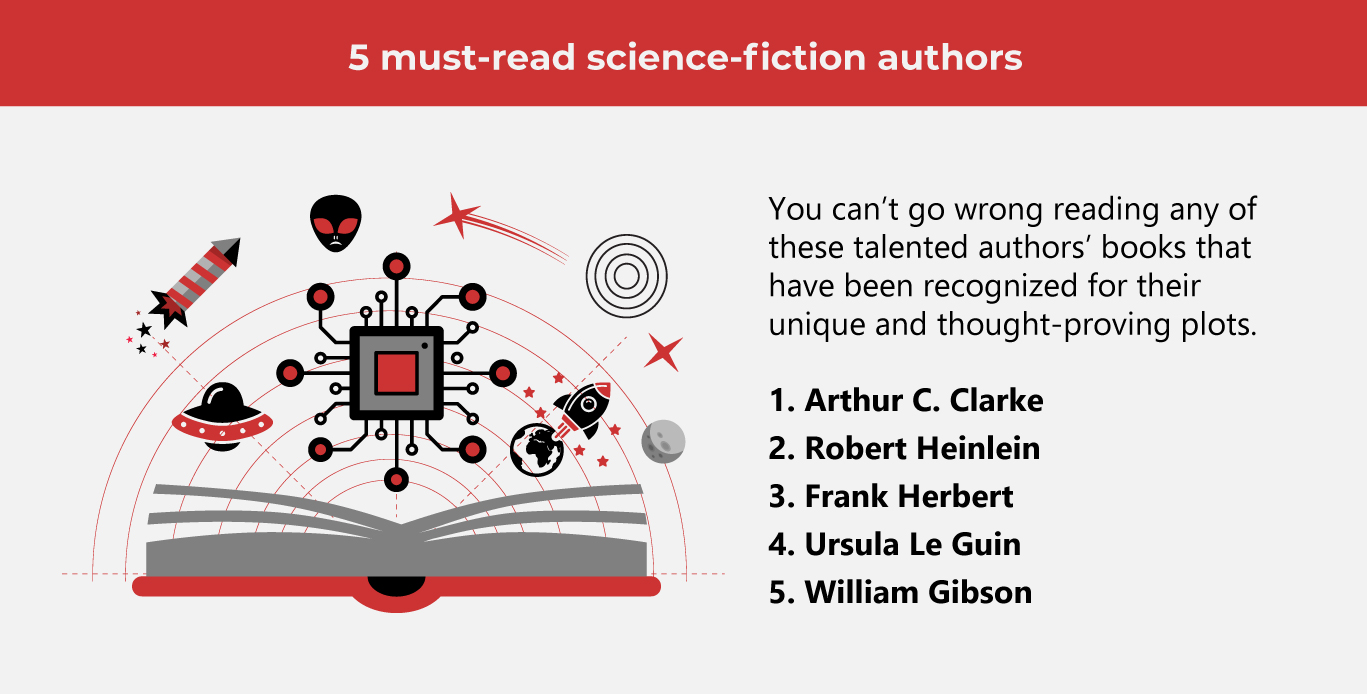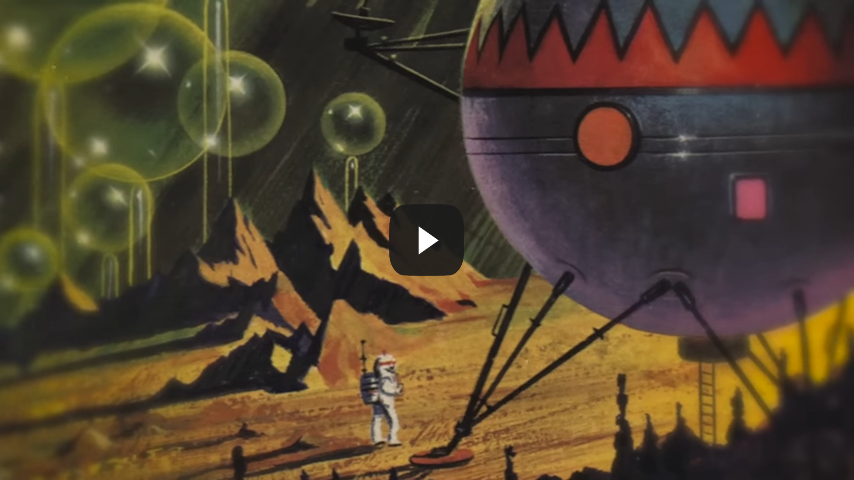10 Must-Read Books about the Digital Age

Robots, space travel, swiping on the screen to access satellite data--we've seen and read about these things in movies, TV shows, and books from decades ago. These achievements seemed impossible back then, but now, they're part of our everyday lives.
The human race may already be thick in digital development, but the cyber possibilities remain plentiful. As we test the limits of technology, it's still nice to read about how far we've come and what's still out there to explore. Whether you like science fiction with wild plotlines or nonfiction reads that help you understand technology better, there's a book guaranteed to satisfy and feed your mind.
Our top 5 science-fiction picks
Allow these books to transport you to fantastic yet familiar worlds while letting you reflect on life's realities.
- I, Robot
Author: Isaac Asimov
Year published: 1950
If you love science fiction and haven't picked up this collection of short stories from one of the most influential sci-fi writers of our time, then you're missing out big time. Asimov wrote these nine stories, originally published in various sci-fi magazines in the 1940s until 1950.
What made this book pioneering was that Asimov introduced robots with ethical conviction rather than metal antagonists out to annihilate the human race. In Asimov's world, robots are forbidden to harm humans, whose orders they should follow. Succeeding sci-fi authors used this code of ethics for their novels, attesting to Asimov's pioneering thinking.
- Ubik
Author: Philip K Dick
Year published: 1969
Described by Time magazine as an "unsettling existential horror story" and chosen as one of the 100 best novels since 1923, Ubik tackles psychic abilities, espionage, and cryonics. What makes it a thrilling read is its exploration of reality versus perception in a highly philosophical way. Though the novel didn't receive awards when it was published, it is considered a classic sci-fi book, influencing the genre over the years.
- Neuromancer
Author: William Gibson
Year published: 1984
This novel is one of the first and most popular sci-fi books from the sub-genre cyberpunk, which emerged in the 1980s.
In Neuromancer, the main character is a has-been hacker hired to break into an artificial intelligence system. With the help of riffraff characters, the protagonist makes headway into his mission, only to realize that the distinction between real life and virtual reality is unclear.
As the only novel to win the Hugo, Nebula and Philip K Dick awards, Neuromancer is credited for formulating the term cyberspace.
- Oryx and Crake
Author: Margaret Atwood
Year published: 2003
Though some argue that this is more speculative fiction than science fiction, it can't be denied that its sci-fi elements leave a deep impression on the reader.
Set in a post-apocalyptic world, the plot revolves around the last human standing after a catastrophic event destroyed the world. The story unravels with the character's recollection of how his society used to be ruled by corporations that wielded genetic engineering. Along with biotechnology, the novel also tackles themes of environmental devastation, the moral and ethical dilemmas of digital progress and corporate power.
- This is How You Lose the Time War
Authors: Amal El-Mohtar & Max Gladstone
Year published: 2019
Romance, espionage, and time travel all come into play in this novella, which won the BSFA, Nebula, and Hugo Awards.
The main characters are referred to by their code names—Red and Blue—spies from battling regimes who manage to fall in love with each other without actually seeing each other. While traversing numerous universes, they leave each other messages, which gradually transition from snarky to heartfelt.
Our top 5 non-fiction reads on technology
What changes have digital technologies brought about? What are their impacts on our lives? Read these books to better grasp the digital era we live in today.
- Cyber War: The Next Threat to National Security and What to Do About It
Authors: Richard A. Clarke and Robert Knake
Year published: 2010
Even though the book is US-centric, anyone who values national security can relate to this well-received book. While we used to fear atomic bombs and biological warfare as triggers for international conflicts, Clarke and Knake present another possible cause: cyber activities.
While effectively defining cyber war, the book also discusses cyber criminals and how they can threaten the nation's security. It takes you to the goings-on inside the White House to how the US is beefing up its cyber defense. But the real question is—are these defenses enough?
- The Information: A History, A Theory, A Flood
Author: James Gleick
Year published: 2012
Even more than a decade after its publication, this novel by renowned science author James Gleick is still a good read. The book explores humanity's relationship with information and how this evolved throughout history. In this digital age wherein there's a deluge of data from the internet, Gleick effectively breaks down how this is altering our mindsets and lifestyles.
- Life 3.0: Being Human in the Age of Artificial Intelligence
Author: Max Tegmark
Date Published: 2017
Artificial intelligence has now become part of our daily lives. From diagnosing diseases to ensuring quality control, AI has been boosting operations in various sectors, including agriculture, retail, the arts and many others.
In his non-fiction book, Tegmark discusses the systems that fuel modern-day AI methods and their potential impacts in the years to come. While the author doesn't state a specific outcome due to humanity's growing reliance on AI, the message is clear: we must take steps to protect ourselves and our future from its negative effects.
- The Four: The Hidden DNA of Amazon, Apple, Facebook and Google
Author: Scott Galloway
Year published: 2015
Celebrated business professor Scott Galloway deeply delves into the tech industry's major players to learn what drives their success. The result of this exploration? An insightful take on how these companies have learned to influence our basic psychological needs faster and more efficiently.
Whether you patronize these big businesses or not, the book also gives valuable knowledge on how to utilize their strategies for your development.
- Broad Band: The Untold Story of the Women Who Made the Internet
Author: Claire L. Evans
Year published: 2018
When you read about the history of the internet, males dominate the scene, with names like Tim Berners-Lee, Vint Cerf, and Bob Kahn popping up. But in truth, women have also done their part in propelling the internet into the necessity it has become today.
This book highlights the female innovators who contributed to digital growth, including mathematician Grace Hopper, who played a crucial role in developing programming languages after World War II. Then there's Stacy Horn, who founded one of the first virtual communities—the basis of today's social networks. Along with these names, you'll also pick up new facts about internet history that continue to shape our lives today.


As one of the Top 19 EMS companies in the world, IMI has over 40 years of experience in providing electronics manufacturing and technology solutions.
We are ready to support your business on a global scale.
Our proven technical expertise, worldwide reach, and vast experience in high-growth and emerging markets make us the ideal global manufacturing solutions partner.
Let's work together to build our future today.
Other Blog



